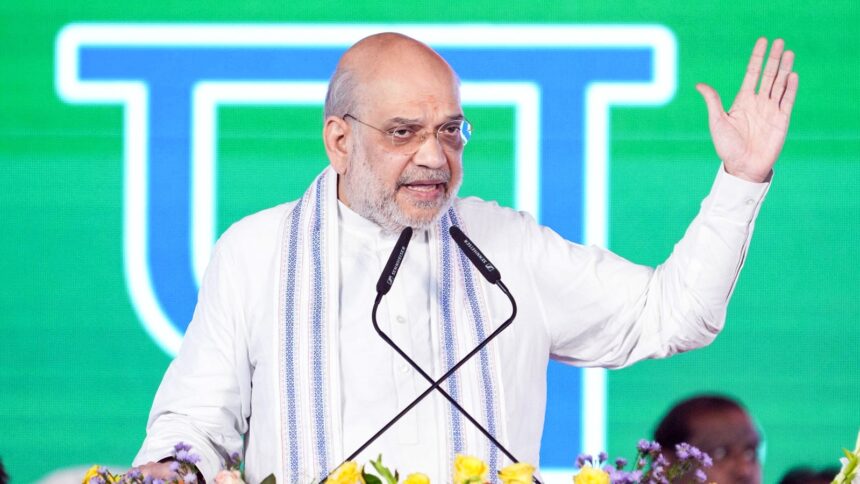Union Home Minister Amit Shah said Friday that Pakistan will not be able to fight a “war with complete information” for a long time “in view of total destruction of its surveillance infrastructure” in India’s strikes in Pakistan-occupied Kashmir and Pakistan earlier this month.
Shah, who is on a two-day visit to – his first since India’s ‘Operation Sindoor’ strikes – was addressing the Border Security Force in Poonch, the town that was hardest hit by cross-border shelling in the aftermath of the strikes.
The strikes were in retaliation to the Pahalgam terror attack in which 26 people — including a Pakistan national — were killed. Border tensions between India and Pakistan escalated in the aftermath.
In his speech, Shah, who arrived in the Union Territory Thursday, referred to a report that was received from Director General BSF in the aftermath of the strikes. “The biggest damage on the Pakistan side has been the destruction of its surveillance capabilities,” he said. “You destroyed their entire surveillance network one by one, which the enemy may take 4-5 four years to re-establish…Woh ab lambey samay tak sampuran jankari wali ladai nahi lad payega (It will not be able to fight a war with complete information about the other side for a long time),” he said.
When Pakistan attacked India’s residential areas in the aftermath of the strikes, the BSF in Jammu Frontier destroyed more than 118 of their posts, he said, adding that “completely destroying or causing extensive damage to such a large number of posts in just three days is a very big thing”.
“This means that even during peace time you continued keeping surveillance on their `vidunsak’ (destructive) infrastructure. You kept this precise information in mind and also made preparations about how to cause maximum damage within the shortest possible time,” he said.
The BSF faces the first assault on the country’s frontiers, he said. “That is why every child in the country also knows you as the first line of defence of the country,” he said.
During his visit, Shah also met families who lost their loved ones in the cross-border shelling when border tensions escalated. At an event organised in Poonch to give job offers to those families that saw deaths in the shelling, Shah said that India’s defence mechanism will become stronger “in view of the deeds of the terrorists and Pakistan”.
“The entire sequence of events has showcased India’s defence policy and has shown to the entire world that it will not tolerate any sort of assault on its citizens,” he said, adding that any attacks will be responded to with “much more precision and severity”.
Hundreds of terrorists were killed in the strikes, Shah said, saying this was the “perhaps the first time that India’s defence forces destroyed a terror headquarters linked to various outfits in Pakistan”.
“This befitting reply could be possible only due to the bold political will and decision of the Prime Minister , coupled with accurate information by our intelligence agencies and our defence forces’ courage and precision strike capabilities,” he said.
He went on to say: “Under that policy of responding to every terror attack with the same swiftness and severity, India had destroyed terror camps in Pakistan and Pakistan-occupied Kashmir on the night of May 7. We had attacked terrorists, but Pakistan took it as an attack on itself and proved before the entire world that it was harbouring terrorists and it had been a safe haven for terrorists”.
There was neither any attack on Pakistan’s army camps nor were their civilians killed “as the Indian forces had in a precise and calibrated response” to Pahalgam terror attack, he said.
“But what Pakistan did – shelling residential areas of Jammu and Kashmir the next day – is baffling,” he said. “And when Pakistan attacked our civilians, the Indian defence forces gave befitting reply and destroyed nine of their air stations and damaged their striking capabilities, making them ask for a ceasefire.”
Prime Minister Narendra Modi had already made clear that terror and talks cannot go together, just like “blood and water cannot flow together”, he said.
No compensation or job can make up for the loss of human lives, he said. “This is just a gesture to express the feelings of the Jammu and Kashmir government, the Centre and the people of India. It is to say ‘we are with you’,” he said.








